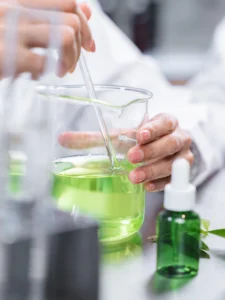
Cosmetic formulation
We explore how active ingredients and formula stability are essential to creating safe skin-care products.

Dr. Inés Gracia Darder is a dermatologist specialising in dermal pathologies and skin care. She is currently an assistant dermatologist at the Son Espases Hospital in Palma de Mallorca, where she also treats patients at the best-specialised clinics in the Balearic Islands.
Thanks to the experience and advice of specialists of Inés’ stature, we understand the importance of good skin care daily and specifically in the workplace. PRODERPHARMACARE® was able to talk to her about skin care and healthy skin habits for professionals in the workplace.
Their answers will not leave you indifferent.
—Hand washing is very different depending on the individual habits of each person. Not exposed skin to chemical agents, nor the requirement of regular washing, and that does not have any underlying pathology does not require continuous washing. It is essential to know that our skin contains a diverse microbiota set, especially bacteria that live in symbiosis on our skin and protect it from the external environment.
Ideally, the skin should be washed sparingly to protect the skin microbiota, however many jobs require continuous washing to prevent the transmission of infection or to promote asepsis when working with food or in a sanitary environment. In these cases, hands must be washed more often with soaps that respect the skin barrier.
It is also crucial that washing is done with lukewarm water, that the skin is not in contact with water for too long, as this dries it out more, and that soap residue is properly removed to avoid irritation. Finally, good drying is especially important in areas that may remain damp, such as the interdigital area.
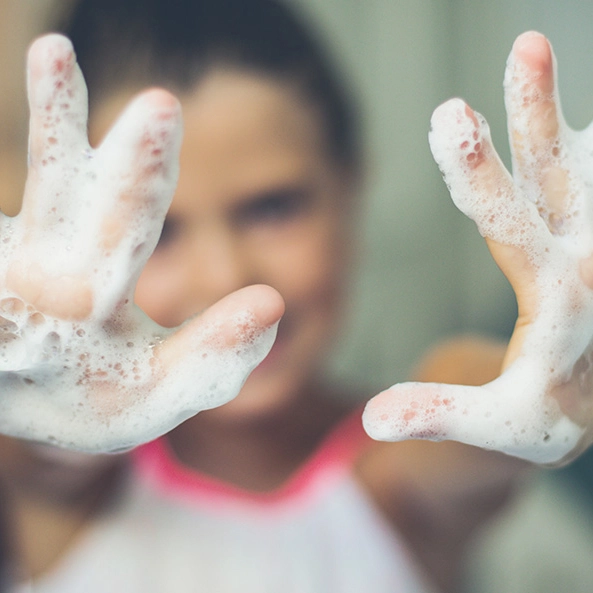
—Daily washing with a skin-friendly, pH-neutral soap that cares for the skin barrier. For hands that are in contact with aggressive agents, it is particularly important to moisturise the skin at least once a day to reinforce the skin barrier.
—Of course, when the skin is particularly dehydrated or the skin barrier is disrupted, it is more likely to develop cracks that serve as an entry point for bacteria or other micro-organisms to cause infection. An infection can be detected by the skin becoming redder, warmer, swollen and shiny.
It is also possible that when wounds become infected, we may see a yellowish crust, especially characteristic when the infection is caused by the most common bacteria on the skin, Staphylococcus aureus. Infections can also appear around the nails (paronychia), which is often particularly painful.
—The skin barrier is the outermost layer of the body, which has multiple functions, one of the main ones being the barrier function to protect us from the outside environment by preventing the entry of pathogens and preventing water loss. For this reason, in a sense, the skin is impermeable to protect us.
However, continued skin exposure to atmospheric agents or harsh chemicals can weaken the barrier, causing it to lose its normal homeostasis and weaken against the entry of bacteria. This results in skin inflammation as the immune system attempts to repair the disruption barrier. In addition, when the skin is weakened, it is more susceptible to bacteria entering and causing infection.
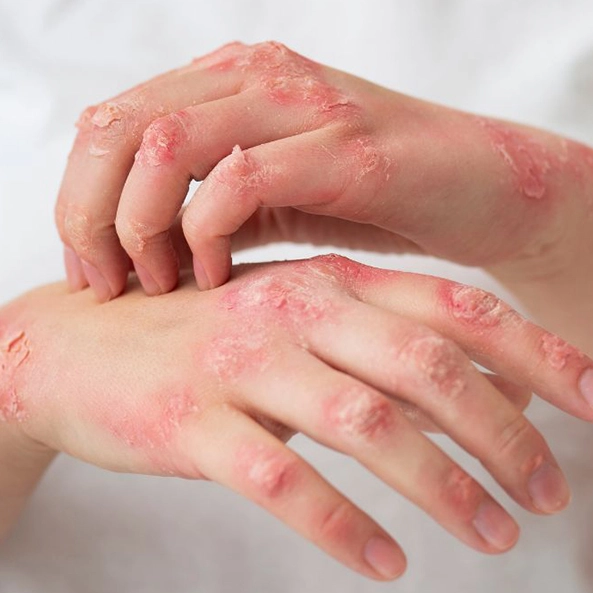
—Exposure to chemical agents increases the likelihood of destroying the skin barrier, resulting in wounds that increase the likelihood of an allergen attack on the immune system. These allergens, when considered foreign, trigger an immune response to protect against them, leading to continued inflammation of the skin. It desease is called allergic contact dermatitis.
Allergic contact dermatitis occurs when a specific individual becomes allergic to compounds, which is normally tolerated by the rest of the population. When allergic contact dermatitis develops to a particular chemical compound, very strict protective measures must be taken to prevent the skin from coming into contact with the compound, thus avoiding severe inflammation in the form of redness and flaking with the appearance of itchy, painful wounds. These symptoms do not cease until the person is no longer in contact with the allergen.
—Of course, continuous washing alters the skin’s microbiota, and also the lipid layer, causing the skin to become drier (xerosis) and the barrier to become unstructured and irritant contact irritative dermatitis, inflammation of the skin caused by irritants such as soaps and other chemicals.
It is manifested by scaling and redness and even some wounds and cracks in the skin, especially in the area of the thumbs and the interdigital membrane.
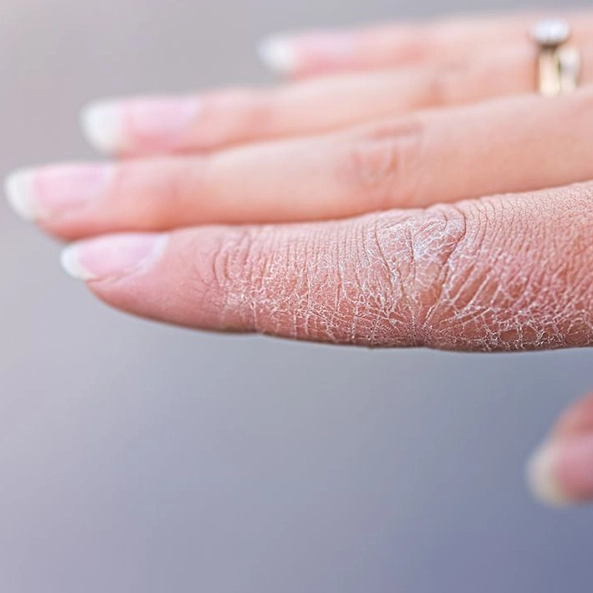
—We know that sun exposure to the skin, especially during the hours with the highest UV index, has a photo-ageing and carcinogenic effect, which increases the risk of skin cancer, both melanoma and carcinoma. The effect is cumulative: the more sun exposure, the more DNA alterations and mutations occur, which increases the risk of malignant lesions appearing on the skin. In addition, sun exposure increases spots, such as sun spots and the appearance of wrinkles due to the loss of collagen and elastin, making the skin more lax and thinner.
—Yes, healthcare workers should take special care as many infectious diseases are transmitted by direct contact through the hands. When the skin is healthy, it can come into contact with bacteria that do not cause infection thanks to the barrier effect of our skin, but in the case of more fragile, immunosuppressed or injured patients or persons we could transmit these bacteria, generating severe infections.
In the hospital setting, it is significant because there are often more antibiotic-resistant bacteria in the environment, which we call “nosocomial”. For this reason, proper hand-washing and water-alcohol solutions are essential for patients. To prevent constant hand hygiene from altering our skin barrier, we can use moisturising creams, as well as limit contact with aggressive chemicals and extreme temperatures, whether hot or cold.
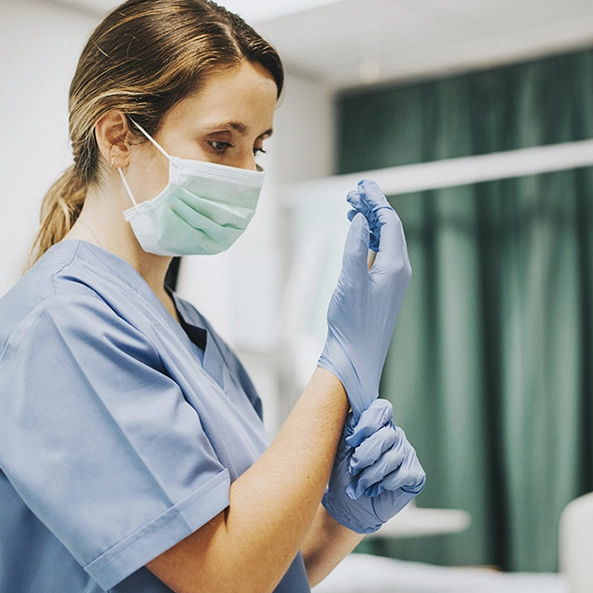
—Whenever we can use gloves to provide the right barrier function on the skin. Sometimes, people may be allergic to some of their components. In these cases, we recommend cotton gloves, which are usually hypoallergenic.
PROSET DERMASAFE, seems to be a good option that acts as a “second skin” to prevent chemical agents from altering the skin structure and producing wounds and fissures.
—When, in addition to flaking, the skin is reddened, with cracks, wounds or scabs. The symptoms of contact dermatitis usually require treatment with skin anti-inflammatory drugs and corticosteroids to reduce inflammation and re-establish the skin barrier.
When the skin has dermatitis, the barrier is unstructured and moisturising creams tend to sting. It is the moment when we have to apply the medical treatment called anti-inflammatory creams. The skin recovers, and we can return to moisturising creams to reinforce the skin barrier and prevent new dermatitis outbreaks.
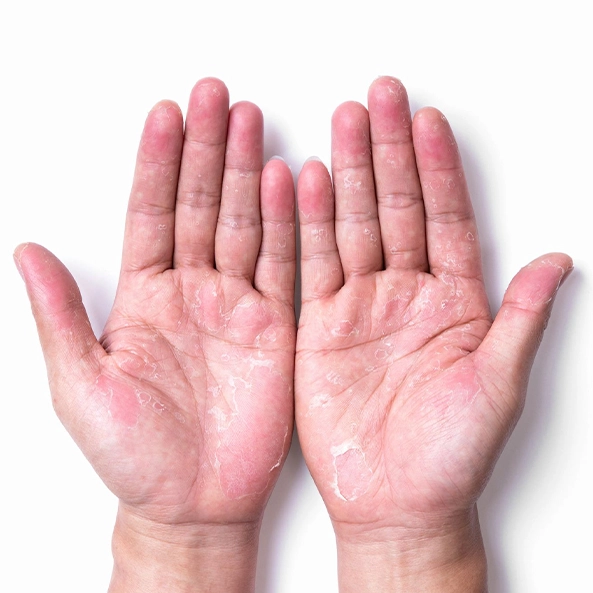
—Moisturising creams must restore the skin’s lipid mantle to retain water and keep the skin hydrated. Examples of components are ceramides, hyaluronic acid, glycerin, etc.
They must contain as few allergens as possible, such as perfumes and preservatives, as patients with allergic contact dermatitis may react to some of these components. Newer, more current formulations try to restore the skin’s microbiome with pre-probiotics.
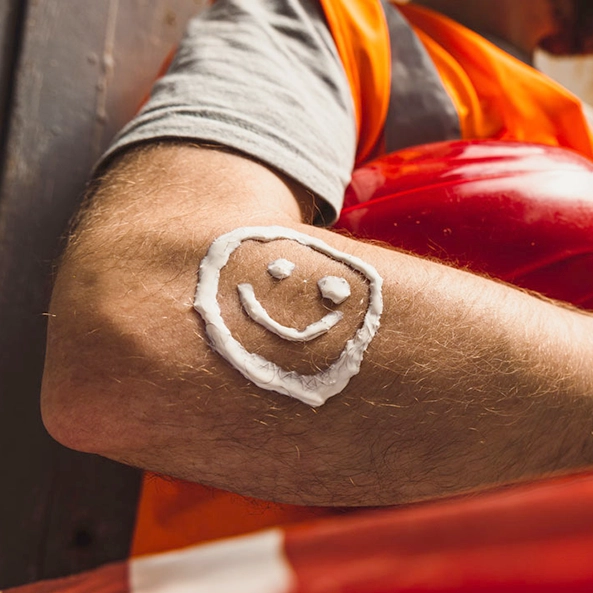
· Food & Beverage industry:
—Gloves, respectful hand washing and good daily moisturising.
· Heavy industry/construction/mechanics
—Gloves, hand washing to remove chemical agents and good daily moisturising.
· Outdoor workers:
—Respectful but necessary hand washing to remove pollution and good daily moisturising.

We explore how active ingredients and formula stability are essential to creating safe skin-care products.

The skin acts as a first line of defence against atmospheric effects. How can you protect your skin from the weather and pollution?

The environmental impact of cosmetics in the hotel industry is devastating to the ecosystem. Sustainable products reduce the damage.